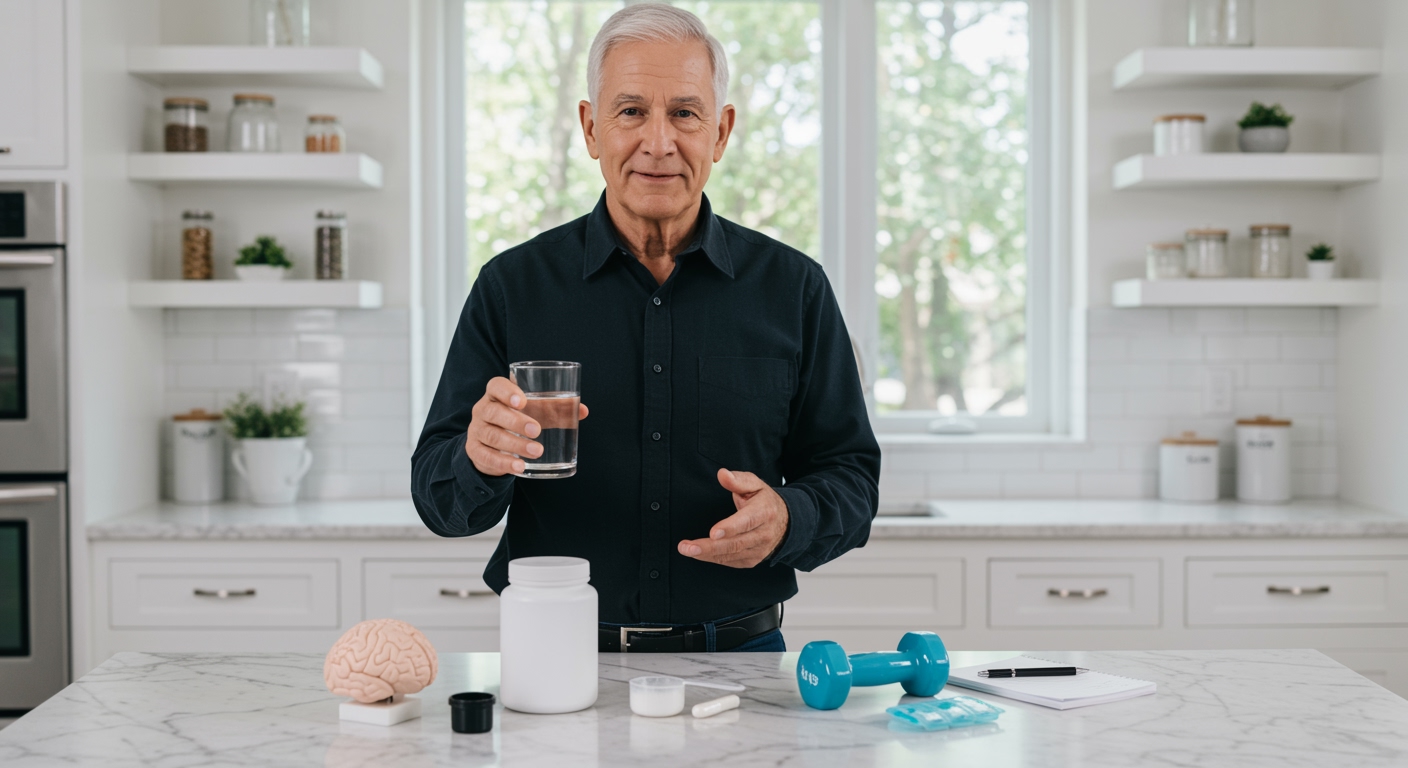✪ Key Highlight: Daily creatine supplements help Alzheimer’s patients maintain muscle strength and may improve brain function.
Introduction
Scientists just discovered something that could change how we help people with Alzheimer’s disease.
New research from the University of Kansas shows that a simple, affordable supplement might help Alzheimer’s patients keep their muscle strength and even boost their brain function.
Hi, I’m Abdur, your nutrition coach and today I’m going to analyze this groundbreaking study about creatine supplementation for Alzheimer’s patients.
Why Do Alzheimer’s Patients Lose Muscle?
People with Alzheimer’s disease face a double problem that most people never think about.
They lose muscle mass and strength as the disease progresses, which makes their condition even worse.
This muscle loss happens because Alzheimer’s affects the nervous system that controls muscle function.
Studies show that nerve and muscle problems can actually start before memory loss becomes obvious in Alzheimer’s patients.
When older adults with mild cognitive problems did resistance training for six months, their muscles got stronger.
Animal studies also prove that improving muscle health can boost brain function, making muscle a key target for Alzheimer’s care.
✪ Fact: Muscle problems can appear before memory loss in Alzheimer’s patients.
How Does Creatine Work In The Body?
Creatine monohydrate is famous for helping athletes build muscle, but its role in Alzheimer’s was unclear until now.
Most creatine in your body gets stored in muscles as phosphocreatine, which helps keep energy levels steady during intense activity.
When you take creatine supplements, you boost phosphocreatine levels and help regenerate ATP, the main energy molecule your muscles need.
ATP is like the battery that powers every muscle contraction in your body.
Research strongly supports creatine’s muscle-building benefits in healthy adults, but scientists knew little about its effects in people with Alzheimer’s.
The University of Kansas researchers wanted to fill this knowledge gap with their groundbreaking study.
✪ Pro Tip: Creatine works by restoring ATP energy in muscle cells during contractions.
What Did The Muscle Study Find?
The University of Kansas study included 20 participants aged 60 to 90, all with probable Alzheimer’s dementia.
For eight weeks, each person took 20 grams of creatine monohydrate daily, split into two 10-gram doses mixed with their drink of choice.
Researchers measured handgrip strength using a calibrated device, focusing on the dominant hand.
Ten participants also had their lower-body strength tested using a machine that measures the force of leg muscles.
Muscle size was checked in 18 people using ultrasound to measure the cross-sectional area and thickness of key thigh muscles.
The results showed that creatine supplementation was safe and well-tolerated by all participants.
There was a noticeable increase in muscle strength and size after eight weeks, especially in handgrip and lower-body muscle tests.
✪ Note: Participants took 20 grams daily because this high dose ensures enough reaches the brain.
Did Creatine Also Help Brain Function?
A separate pilot study at the University of Kansas Medical Center explored whether creatine could help brain function in people with Alzheimer’s.
This was the first study to look at creatine’s effects on cognition in this group.
The research team, led by Dr. Matthew Taylor, found that creatine supplements led to moderate improvements in working memory and executive function.
Working memory is what you need for tasks like remembering where cards are in a matching game.
Executive function involves focusing and ignoring distractions, which are both often affected by Alzheimer’s disease.
Blood samples and brain scans showed an 11 percent increase in brain creatine levels after the study.
Dr. Taylor said seeing brain creatine levels change in Alzheimer’s patients was really exciting because that 11 percent represents a significant increase.
✪ Fact: Brain scans confirmed an 11% increase in brain creatine levels after supplementation.
What Are The Study Limitations?
While the results are promising, both studies had important limitations that we need to consider.
The studies included small sample sizes and lacked a control group for comparison.
Dr. Taylor cautioned that more research is needed to confirm the findings and understand how creatine might help the brain.
He suggested that creatine could reduce inflammation and oxidative stress, both of which play a role in brain aging.
Larger and more rigorous clinical trials are needed before creatine can be widely recommended for Alzheimer’s patients.
The studies were conducted at the University of Kansas Medical Center with participants recruited through the KU Alzheimer’s Disease Research Center.
✪ Note: These were pilot studies that need larger trials for confirmation.
The Bottom Line
These early studies suggest that creatine supplementation could be a simple, low-cost way to help people with Alzheimer’s disease keep their muscles strong and possibly improve brain function.
Sometimes the most powerful interventions are the simplest ones we overlook.
I would love to hear your thoughts about this research and whether you think creatine supplementation could become a standard part of Alzheimer’s care in the future.
References
At NutritionCrown, we use quality and credible sources to ensure our content is accurate and trustworthy. Below are the sources referenced in creating this article:
- News Medical: Creatine increases muscle strength in Alzheimer’s patients
- University of Kansas Medical Center: Creatine Alzheimers Research
- Frontiers in Nutrition: Creatine supplementation in Alzheimer’s disease
- PMC: Effects of creatine supplementation on muscle health
- Alzheimer’s Discovery: Creatine supplement analysis





